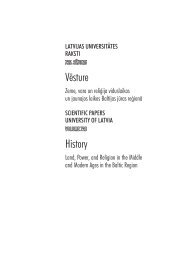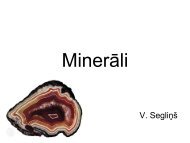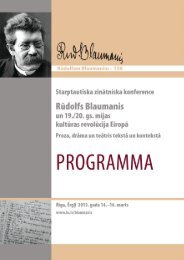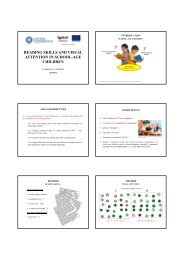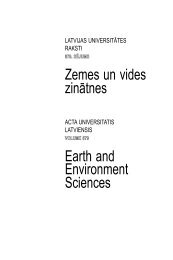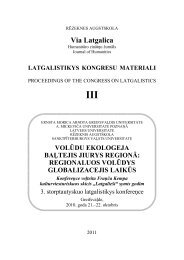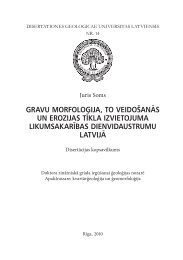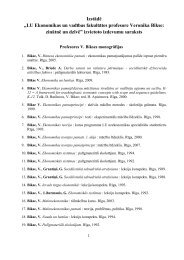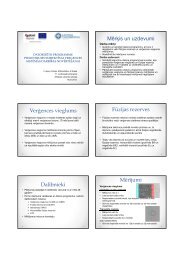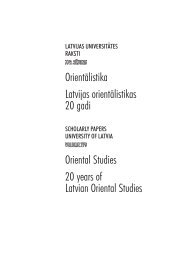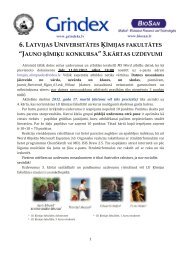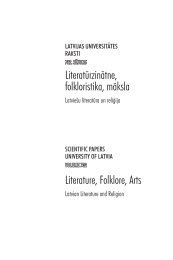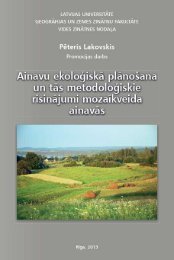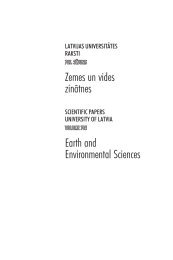Untitled
Untitled
Untitled
Create successful ePaper yourself
Turn your PDF publications into a flip-book with our unique Google optimized e-Paper software.
LATVIJAS UNIVERSITÂTES RAKSTI. 2004. 666. sçj.: LITERATÛRZINÂTNE, FOLKLORISTIKA,<br />
MÂKSLA, 24.–35. lpp.<br />
The Postcolonial Syndrome and<br />
Identity Crisis in Latvia<br />
Pçckoloniâlais sindroms un identitâtes krîze Latvijâ<br />
Sigma Ankrava (Latvia)<br />
Latvijas Universitâtes Moderno valodu fakultâte<br />
Visvalþa iela 4a, Rîga, LV 1011<br />
e–pasts: Sigma Ankrava@lu.lv<br />
The society in contemporary Latvia experiences the same problems other Asian or Afraican<br />
countries had had after regaining independence. Thus the statement is valid that Latvia is in a<br />
postcolonial situation characterised by the postcolonial syndrome and crisis of identities. A<br />
succfessful integration of society in the future is possible only rehabilitating the principle of<br />
historic justice, attributing a contemporary content to the notion of “national” and continuing<br />
to build Latvian state structures on the basis of principles of parliamentary democracy.<br />
Keywords: Identity, post–colonialism, society integration.<br />
The modern world influenced by globalisation has created a number of problems.<br />
One of these problems is preserving the identity. This problem has affected not only<br />
a mere individual, but also the state. To solve this problem states establish relevant<br />
institutions and hire professional image makers. Individuals had to cope with this<br />
problem by themselves since the beginning of time. The philosophers of antiquity<br />
and Orient were encouraging people to it by teaching: “Know thyself!” Even today<br />
the individual who was raised from his anonymous existence and turned into a personality<br />
by the ideology of the Renaissance risks losing this identity in the modern<br />
world. In Latvia both these problems – the problem of preserving the identity of the<br />
state and the problem of preserving one’s personal identity – are equally important.<br />
They are closely intertwined.<br />
Presently Latvia finds itself in a postcolonial situation. In the twentieth century<br />
Latvia has liberated itself from colonial regimes twice. In 1918 it proclaimed its independence<br />
for the first time liberating itself from seven hundred years of German<br />
and two hundred years of Russian/German rule, and for the second time in 1991 when<br />
it broke away from the Soviet system. In the postcolonial discourse this topic is often<br />
neglected. There are many reasons for this. In the 1950s ies these reasons were well<br />
described by Czeslaw Milosz in his “The Captive Mind”. Recently I found a profound<br />
analysis of this problem in an article by Dr. Kârlis Racevskis called “Toward a<br />
Postcolonial Perspective on the Baltic States”. In Latvia the philosopher Vilnis Zariòð<br />
has analysed the topic in a most interesting way.<br />
As the former minister of foreign affairs Georgs Andrejevs has stated, on the<br />
official level the evidence suggests that there can be no doubt about the fact that the<br />
Soviet regime was imposed on Latvia first by occupation and then by the following<br />
colonisation of an independent state. 1 The first document to state the occupation was<br />
the report by Marie Antoinette von Lowzow (Doc. 1173) presented to the Consultant<br />
(now Parliamentary) Assembly of the Council of Europe on its 19th session September<br />
28, 1960 on the situation in the Baltics to commemorate the 20th anniversary of the



